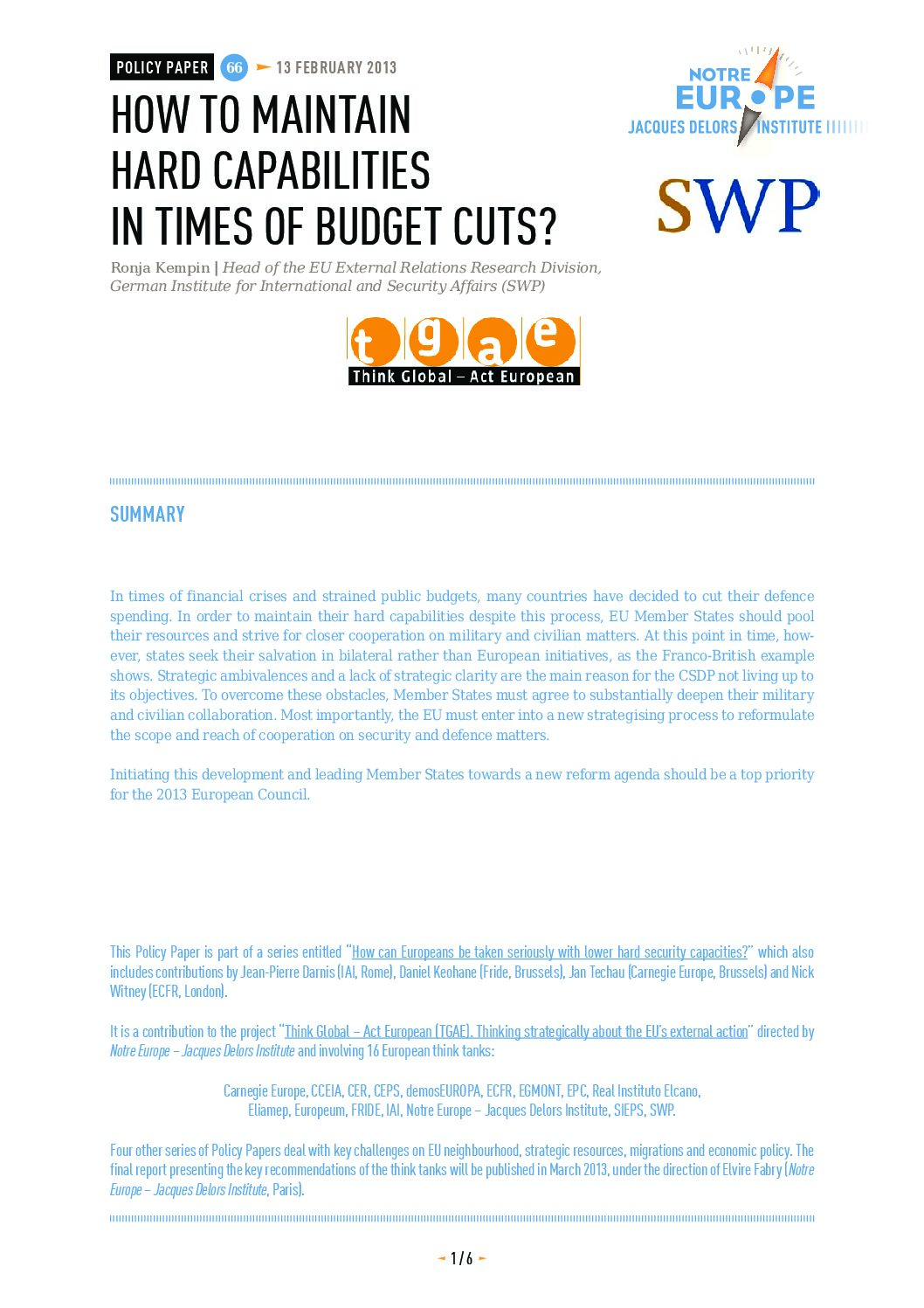Policy Paper 66
Comment maintenir des capacités de défense en période de restriction budgétaire ?
Ronja Kempin, Directrice du département Relations Extérieures de l’ UE, SWP —
In times of financial crises and strained public budgets, many countries have decided to cut their defence spending. In order to maintain their hard capabilities despite this process, EU Member States should pool their resources and strive for closer cooperation on military and civilian matters. At this point in time, however, states seek their salvation in bilateral rather than European initiatives, as the Franco-British example shows. Strategic ambivalences and a lack of strategic clarity are the main reason for the CSDP not living up to its objectives. To overcome these obstacles, Member States must agree to substantially deepen their military and civilian collaboration. Most importantly, the EU must enter into a new strategising process to reformulate the scope and reach of cooperation on security and defence matters. Initiating this development and leading Member States towards a new reform agenda should be a top priority for upcoming EU presidencies.
Disponible en anglais uniquement
Ce Policy Paper est une contribution de Ronja Kempin (SWP, Berlin) au projet ‘Think Global – Act European (TGAE). Thinking Strategically about the EU’s external action dirigé par Notre Europe – Institut Jacques Delors(rapport disponible en mars 2013, dir. Elvire Fabry, Chercheur Senior, Notre Europe – Institut Jacques Delors).
In times of financial crises and strained public budgets, many countries have decided to cut their defence spending. In order to maintain their hard capabilities despite this process, EU Member States should pool their resources and strive for closer cooperation on military and civilian matters. At this point in time, however, states seek their salvation in bilateral rather than European initiatives, as the Franco-British example shows. Strategic ambivalences and a lack of strategic clarity are the main reason for the CSDP not living up to its objectives. To overcome these obstacles, Member States must agree to substantially deepen their military and civilian collaboration. Most importantly, the EU must enter into a new strategising process to reformulate the scope and reach of cooperation on security and defence matters. Initiating this development and leading Member States towards a new reform agenda should be a top priority for upcoming EU presidencies.
Avant la publication du rapport final présentant les recommandations clés des16 think tanks mobilisés dans ce projet, 5 séries de Policy Papers portent sur les sujets suivants : PSDC, Voisinage de l’UE, Ressources stratégiques, Migration et Politiques économiques.
Ce Policy Paper fait partie de la série intitulée «Comment les Européens peuvent-ils rester crédibles avec des capacités de défense réduites?», qui comprend les contributions de Nick Witney (ECFR, London), Jean-Pierre Darnis (IAI, Rome), Daniel Keohane (Fride, Bruxelles) et Jan Techau (Carnegie Europe, Bruxelles).
SUR LE MÊME THÈME
ON THE SAME THEME
PUBLICATIONS
Défense européenne: face à l’urgence de financement, quelles stratégies innovantes pour 2025 ?

Préparez-vous : L’austérité budgétaire est de retour en Europe

Promouvoir la paix n’est pas la même chose que combattre la guerre

MÉDIAS
MEDIAS
ÉCONOMIE DE GUERRE: MACRON MET LA PRESSION AUX INDUSTRIELS QUI DÉPLORENT DES DEMANDES INTENABLES

Réarmement : l’Europe traine des pieds, un coût stratégique ET industriel élevé

Défense européenne: face à l’urgence de financement, quelles stratégies innovantes pour 2025 ?


















